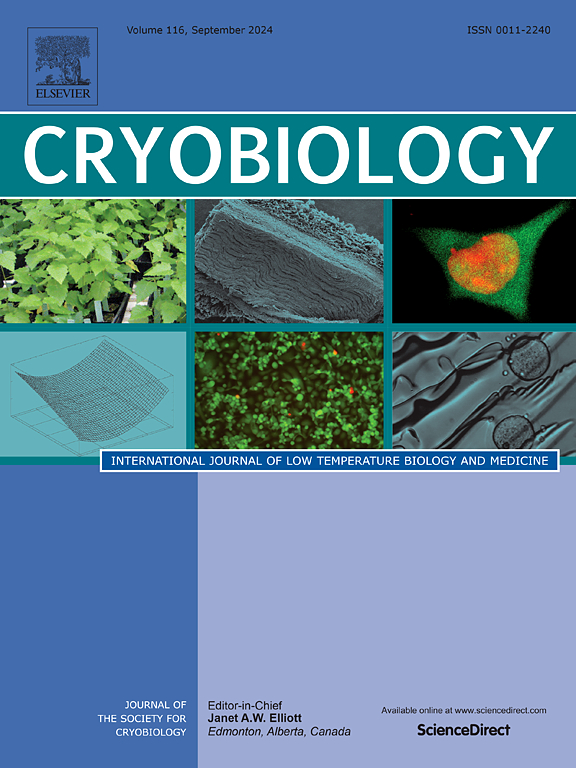Low-temperature stress response: A transcriptomic study of the WRKY family in Prunus davidiana
IF 2.1
3区 生物学
Q2 BIOLOGY
引用次数: 0
Abstract
Low temperature is a crucial environmental factor affecting peach tree growth. The WRKY transcription factor family plays a vital role in plants' responses to low-temperature stress. Understanding the expression patterns and functions of WRKY genes in peach trees under low-temperature stress is essential for uncovering the molecular mechanisms of cold tolerance and guiding the breeding of new cold-tolerant peach varieties. This study analyzed the transcriptome of cold-tolerant peach varieties following low-temperature treatment. Bioinformatics and quantitative real-time PCR were used to systematically analyze the structure, function, and expression characteristics of WRKY family members associated with low-temperature tolerance in peach trees. Results revealed complex transcriptional responses in peach trees under low-temperature stress, with 7029 differentially expressed genes identified and significantly enriched in multiple Gene Ontology terms and Kyoto Encyclopedia of Genes and Genomes pathways, indicating the diverse mechanisms of low-temperature response. Among the transcription factor families, the ERF, MYB, bHLH, NAC, and WRKY families showed significant responses to low-temperature stress. PpWRKY58 exhibited robust and specific upregulation under low-temperature stress, and yeast transformation showed enhanced activity under low-temperature conditions. This suggests a potential role for PpWRKY58 in peach cold hardiness. While WRKY family involvement in plant responses to low-temperature stress is known, our study reveals the specific function of PpWRKY58 in the peach low-temperature response, offering new insights into peach cold tolerance mechanisms, and suggesting PpWRKY58 as a potential target for improving peach cold hardiness.
低温胁迫响应:李树WRKY家族转录组学研究
低温是影响桃树生长的重要环境因子。WRKY转录因子家族在植物对低温胁迫的响应中起着至关重要的作用。了解WRKY基因在桃树低温胁迫下的表达模式和功能,对于揭示桃树耐寒的分子机制,指导桃树耐寒新品种的选育具有重要意义。本研究分析了低温处理后耐寒桃品种的转录组。利用生物信息学和实时荧光定量PCR技术,系统分析桃树WRKY耐低温相关家族成员的结构、功能和表达特征。结果显示,桃树在低温胁迫下的转录反应复杂,在多个基因本体术语和京都基因与基因组百科全书途径中鉴定出7029个差异表达基因,并显著富集,表明低温响应的机制多种多样。转录因子家族中,ERF、MYB、bHLH、NAC和WRKY家族对低温胁迫有显著的响应。PpWRKY58在低温胁迫下表现出稳健和特异性的上调,酵母转化在低温条件下表现出增强的活性。这表明PpWRKY58在桃树抗寒性中具有潜在的作用。虽然已知WRKY家族参与植物对低温胁迫的响应,但我们的研究揭示了PpWRKY58在桃子低温响应中的特定功能,为桃子耐冷机制提供了新的见解,并提示PpWRKY58可能是提高桃子抗寒性的潜在靶点。
本文章由计算机程序翻译,如有差异,请以英文原文为准。
求助全文
约1分钟内获得全文
求助全文
来源期刊

Cryobiology
生物-生理学
CiteScore
5.40
自引率
7.40%
发文量
71
审稿时长
56 days
期刊介绍:
Cryobiology: International Journal of Low Temperature Biology and Medicine publishes research articles on all aspects of low temperature biology and medicine.
Research Areas include:
• Cryoprotective additives and their pharmacological actions
• Cryosurgery
• Freeze-drying
• Freezing
• Frost hardiness in plants
• Hibernation
• Hypothermia
• Medical applications of reduced temperature
• Perfusion of organs
• All pertinent methodologies
Cryobiology is the official journal of the Society for Cryobiology.
 求助内容:
求助内容: 应助结果提醒方式:
应助结果提醒方式:


